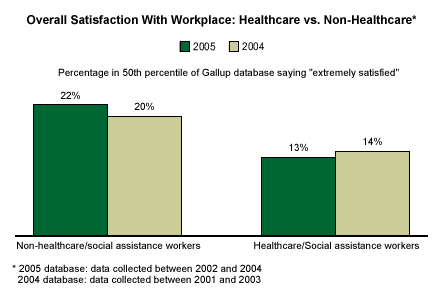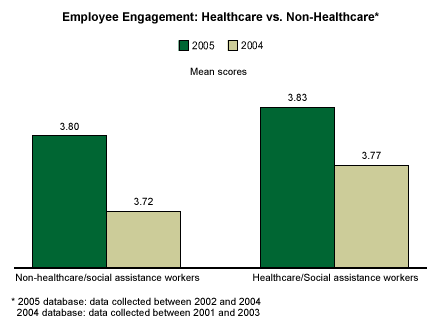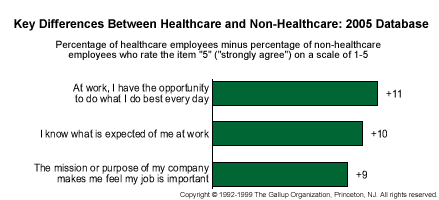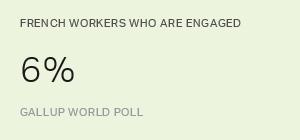Gallup has just released its 2005 employee engagement database, which includes surveys on workplace attitudes collected from 4.5 million employees worldwide -- including more than 1 million from the healthcare and social assistance industry.
The results, which include data collected in 2002, 2003, and 2004, show U.S. healthcare employees are more engaged at work than U.S. non-healthcare employees are -- meaning healthcare employees demonstrate stronger emotional connections to their organizations and the people they work with. However, U.S. healthcare employees are less likely than are U.S. non-healthcare employees to say they are satisfied with the organizations they work for. The 2005 database shows satisfaction with workplaces among U.S. non-healthcare employees has improved somewhat, while satisfaction among U.S. healthcare workers has declined slightly.
Satisfaction With Workplaces
Twenty-two percent of U.S. non-healthcare workers in the 50th percentile of Gallup's database are extremely satisfied with their workplaces, up from 20% in the 2004 database (which contains data collected between 2001 and 2003). In comparison, only 13% of U.S. healthcare employees in the 50th percentile are extremely satisfied, down one percentage point from the 2004 database.

Employee Engagement
Nevertheless, healthcare workers are more engaged in their jobs than U.S. non-healthcare workers are. Gallup measures employee engagement with its Q12 survey, which asks employees to rate 12 aspects of their jobs on a five-point scale, with '1' meaning "strongly disagree" and '5' meaning "strongly agree." The mean engagement score for U.S. healthcare employees in the 50th percentile edges out the mean score for U.S. non-healthcare employees by .03. Mean engagement scores among both U.S. healthcare employees and non-healthcare employees have increased over last year's database figures (.06 for healthcare and .08 for non-healthcare).

How to Improve
How can healthcare organizations build upon their success with employee engagement, and get better at converting it to overall workplace satisfaction? Looking at the three Q12 items that most distinguish the healthcare industry from non-healthcare industries provides some clues.
The percentage of U.S. healthcare employees who give '5s' to the item, I have the opportunity to do what I do best every day, is 11 percentage points higher than the percentage of U.S. non-healthcare employees. And healthcare employees outscore non-healthcare employees by 10 percentage points on this item: I know what is expected of me at work. In other words, job expectations tend to be particularly well-defined in healthcare organizations, and healthcare employees are particularly likely to feel that they are in the right role. These are considered "process" items, indicating healthcare organizations have good processes in place to hire the right people and help those people understand their jobs.
But particularly in healthcare, employee engagement and satisfaction are about more than organizational processes. Healthcare employees also believe strongly in what they are doing and have a relatively high level of commitment to their organizations' missions. U.S. healthcare employees in the 50th percentile outscore U.S. non-healthcare employees by nine points on the item: The mission or purpose of my company makes me feel my job is important.

A strong sense of mission is a common thread among healthcare workers. It is the reason why most people enter the healthcare industry to begin with. Most healthcare organizations are in the process of implementing a tremendous number of strategic initiatives and tactical plans to improve quality and control costs, and a key challenge is integrating all these activities under a unifying theme so employees understand them. In other words, if healthcare administrators want employee buy-in on an initiative, then they must link that initiative to the organization's mission and vision.
Bottom Line
It's no surprise that employee turnover continues to bedevil the healthcare industry. Although healthcare employees are very positive about what they do, they are relatively negative about whom they do it for. Many healthcare employees are on an ongoing quest to find a better environment in which to carry out their personal calling. Healthcare organizations need to go back to the basics and reconnect themselves to their mission in the minds and hearts of their employees.
